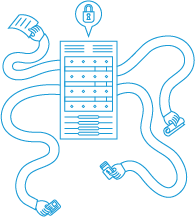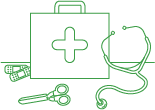A recent case through the Administrative Appeals Tribunal (AAT) - Mfula and Commissioner of Taxation (Taxation) [2021] AATA 3067 (30 August 2021) - has potentially put into question expenses that locum doctors have been claiming as tax deductions over the years.
For many medical practitioners, particularly locum doctors whose role is to provide cover for an absent member of the permanent non-specialist medical staff or when shifts are unable to be filled by overtime or casual medical employees, working from multiple locations and travelling from one hospital to another is commonplace.
Mr. Mfula worked as a medical doctor in Victoria and New South Wales during the period in review. He was providing his services as an employee of various NSW Health Service Local Health Districts (LHDs) and worked at 5 different hospitals in NSW. His locum placement was arranged using a medical locum agency. He was also an assistant surgeon (sole trader) in Victoria, where he lives with his family.
In his income tax return, he included deductions for car-related expenses, travel expenses and meal and incidental costs, which were initially denied by the Commissioner of Taxation and then upheld by the AAT.
Deductible expenditure
The general deduction provision of the Income Tax Assessment Act 1997 states that any loss or outgoing can be deducted from assessable income to the extent that (positive limb):
- It is incurred in gaining or producing your assessable income; or
- It is necessarily incurred in carrying on a business for the purposes of gaining or producing your assessable income
However, you cannot deduct a loss or outgoing to the extent that, amongst others, it is of a private or domestic nature (negative limb).
Both the positive and negative limb must be satisfied for a tax deduction to be claimed, with certain expenses having more specific requirements. Discussed below are the specific expenses that were relevant in this case but are very common expenses for doctors.
Car Related and Travel Expenses
Mr Mfula advised that he used his car to travel from home to the surgery or from the surgery to another workplace or to the airport to take on locum jobs in NSW. He claims that his home was his primary place of business where he would perform administrative duties for his employment and his business as a sole trader.
The Commissioner of Taxation contends that the travel undertaken was not on work but to work or business, and private in nature.
His duties did not commence until he arrived at the relevant surgery or hospitals and the travel between the surgery and hospital or between two hospitals are not on work time, as they refer to different employers, but private. They were also not satisfied that performing administrative duties were sufficient to demonstrate that he ran his business from home and therefore the deduction was denied. In other words, he would need to demonstrate other activities such as seeing patients or performing his surgical duties from home, which would be very difficult to do for an assistant surgeon.
Unfortunately, he was also unable to provide the appropriate level of documentation to substantiate appropriate his claim under the cents per kilometre method but merely estimated the number of kilometres travelled on the days he was away and the days he used the car.
His flights and accommodation costs are paid for by the Medical Locum Agency and therefore no other travel expenses were required to be considered.
Meal and Incidental Expenses
Part of Mr. Mfula’s hourly rate/wages paid by and negotiated with each NSW Health Service LHDs is a meal allowance, although this is not separately identified.
He included a claim in his return for a meal and incidental costs incurred whilst he was away from his home in Victoria at the 5 NSW hospitals, up to the reasonable meal allowance per the Tax Determination issued in the relevant year by the ATO. He was away for 247 days during the year and have appropriate travel diary to support the days he was away.
Food and drink are ordinarily private in nature and generally not deductible unless they have sufficiently close connection to the performance of the employment duties.
The deduction for meal and incidental expenses were denied as he was employed by the various LHD and he was not travelling away from his home overnight in the course of performing his employment duties.
The expenses he incurred on food and drink were incurred because of his personal circumstances, that is living far away from his place of employment. They are therefore considered private in nature and are not deductible.
In addition, the Commissioner also emphasised that the reasonable amounts published through the Tax Determination are not to be taken as automatic deductions. Substantiation is still required (other than bank statements or credit card statements) and the exception for this may be applied if he was to have received a specific travel allowance to cover those expenses.
What does this mean for you?
Although none of the concepts or principles are new, this case has shown how the Commissioner of Taxation and AAT can take a very narrow and strict view of what is deductible expenditure for locum doctors.
Some of the important take-aways are:
1. Establishing and ensuring that expenses are incurred in gaining or producing assessable income, not just connected to producing said assessable income.
2. Appropriate supporting documentation is paramount to substantiate your claim, including the circumstances of those claims or if an exemption /exception is being relied upon.
3. Potentially consider altering locum arrangements, specifically living away from home arrangements, with the relevant medical locum agency or Public Health Organisation.
For more information
As with many application of tax rules, the specific facts and circumstances may change the result for each individual and/or business. If you have any concerns or would like to discuss your specific situation, please contact Arlene Kristianto or your local healthcare specialists at RSM.





